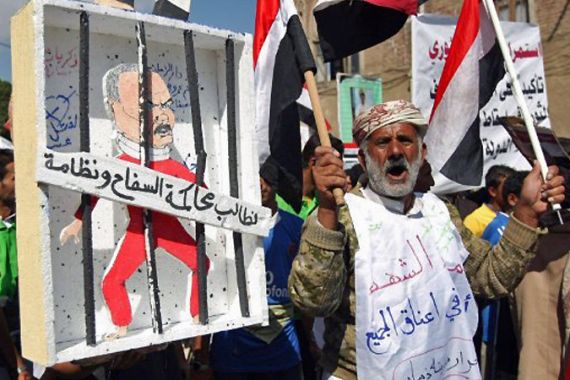
Who is really running Yemen?
As the acting ruler threatens to leave the capital, we ask if Saleh is trying to run the country from behind the scenes.
The crisis in Yemen is taking an unexpected turn.
|
“We knew all the time that we are dealing with a man [Saleh] who is a master of mischief. He is trying to buy time. He has lost any credibility …. This man has come back to Yemen to derail the whole accord. He does not believe in it. He wants his family, his sons and his nephews and his half-brothers to continue ruling from behind the scenes.“ – Mohamed Qubaty, an opposition activist |
Weeks after becoming the country’s acting ruler, Abed Rabbo Mansour Hadi, the Yemeni vice-president, is threatening to leave the capital, Sanaa, if Ali Abdullah Saleh, the president, continues to get in the way.
Under a peace deal agreed in November, Saleh was supposed to give up his powers, becoming honorary president, while Hadi was given acting control until elections in February.
However, Hadi now says that Saleh and his allies will not stop interfering in his duties.
He made the announcement after top Saleh loyalists called him a traitor.
For his part, Saleh has said he will stay in Yemen, reversing a pledge to travel to the US.
Meanwhile, Navi Pillay, the UN’s human rights chief, has condemned an amnesty granted to those who committed war crimes in Yemen.
|
“You cannot have a pre-emptive amnesty. If there has been a deal between the GCC and [Saleh], you can’t just free 500 [suspects] with a flip of a pen. The Yemeni people have the right to question, to probe.” – Khaled al-Maeena, a political analyst |
The GCC-brokered power transfer deal has given Saleh immunity from prosecution.
So, is the deal to transfer power starting to unravel? And could the long-serving president be planning to stay on – running the country from behind the scenes?
Inside Story, with presenter James Bays, discusses with guests: Joseph Keshishian, an author on Middle East affairs and a columnist with Gulf News; Khaled al-Maeena, a political analyst and editor-at-large of numerous Saudi publications; and Mohamed Qubaty, a former advisor to the Yemeni prime minister and an opposition activist.
|
“Yemen is on the verge of internal collapse – economically, politically, militarily as well. A civil war has been reverted so far but we are on the brink of a major catastrophe if this deal doesn’t go through. [Saleh] agreed to the deal but his heart was not in it from the very beginning. He does not care about Yemen or the people because as long as he stays in power and maintains his insistence that he is legitimate president of the country, which he is not, none of the crises on the ground will change.” Joseph Keshishian, an author and columnist |